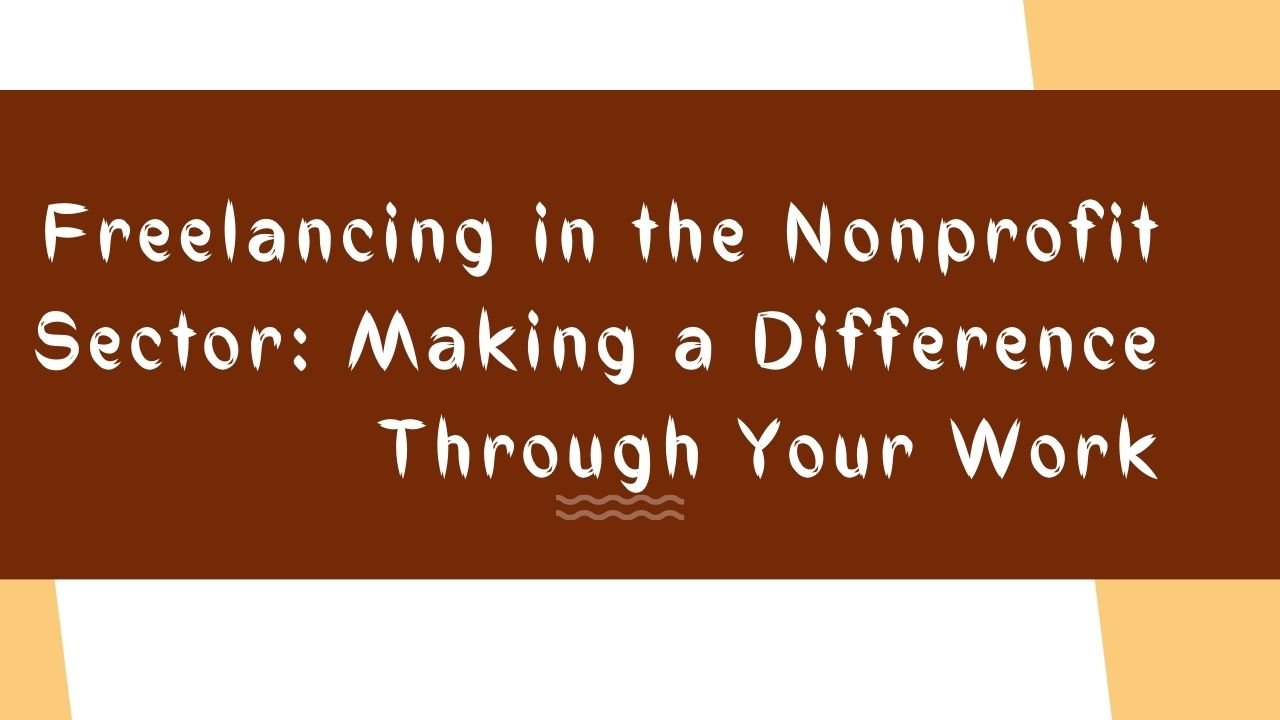Freelancing is a popular and flexible way of working that allows you to pursue your passion and control your own schedule. As a freelancer, you have the opportunity to work on diverse projects with different clients and collaborators. However, you also face some challenges and competition in this dynamic and changing field.
One of the ways to stand out and succeed as a freelancer is to work in the nonprofit sector. The nonprofit sector is composed of organizations that are driven by a social or environmental mission rather than by profit. These organizations include charities, foundations, social enterprises, advocacy groups, and more.
Working as a freelancer in the nonprofit sector can be rewarding and fulfilling. You can use your skills and talents to make a positive impact on the world and contribute to a cause that you care about. You can also enjoy some benefits and advantages that are unique to this sector.
In this guide, we will share some tips and best practices for freelancing in the nonprofit sector. We will also recommend some of the best platforms and tools that can help you find and land nonprofit jobs.
Why Freelancing in the Nonprofit Sector Matters for Freelancers
Freelancing in the nonprofit sector matters for freelancers because it can help you:
- Expand your portfolio: Freelancing in the nonprofit sector can help you diversify your portfolio and showcase your versatility as a freelancer. By working on different types of projects with different types of organizations, you can demonstrate your ability to adapt to different needs, audiences, and contexts. You can also build your reputation and credibility as a freelancer who can deliver quality work for a good cause.
- Grow your network: Freelancing in the nonprofit sector can help you grow your network and connect with people who share your values and vision. By working with nonprofit organizations, you can meet potential clients, collaborators, mentors, or referrals who can help you advance your career or business. You can also join online or offline communities that are relevant to your field or niche and interact with other freelancers or professionals who work in the nonprofit sector.
- Increase your satisfaction: Freelancing in the nonprofit sector can help you increase your satisfaction and fulfillment as a freelancer. By working on projects that align with your passion and purpose, you can feel more motivated, engaged, and happy with your work. You can also feel more proud and rewarded by seeing the results and impact of your work on the world.
How to Freelance in the Nonprofit Sector
Freelancing in the nonprofit sector requires a strategic and intentional approach that combines research, preparation, and communication. Here are some tips to help you freelance in the nonprofit sector:
- Research the sector: The first step in freelancing in the nonprofit sector is to research the sector. You need to understand the trends, opportunities, and challenges that affect the nonprofit sector and its organizations. You also need to identify the types of organizations, projects, or causes that interest you or match your skills and experience. Some of the sources you can use to research the sector are:
- Websites, blogs, or newsletters that cover news, stories, or insights about the nonprofit sector, such as Nonprofit Quarterly, The Chronicle of Philanthropy, etc.
- Reports, studies, or surveys that provide data, analysis, or recommendations about the nonprofit sector, such as Giving USA, The State of Nonprofit Email Cultivation, etc.
- Podcasts, webinars, or events that feature experts, leaders, or practitioners who share their knowledge, experience, or advice about the nonprofit sector, such as Nonprofit Leadership Podcast, Social Good Instigators Podcast, etc.
- Prepare your portfolio: The second step in freelancing in the nonprofit sector is to prepare your portfolio. Your portfolio is a collection of samples or examples of your work that showcase your skills, expertise, and value. Your portfolio should be relevant, updated, and customized to the nonprofit sector and its organizations. Some of the tips you can follow to prepare your portfolio are:
- Include samples or examples of your work that are related to the nonprofit sector or its causes, such as fundraising campaigns, grant proposals, social media posts, etc.
- Highlight the results or impact of your work on the organizations or causes that you worked with, such as metrics, testimonials, or stories.
- Tailor your portfolio to the specific organization, project, or cause that you are applying for, such as using their language, tone, or style.
- Communicate your value: The third step in freelancing in the nonprofit sector is to communicate your value. Your value is the benefit or solution that you can provide to the organization or cause that you are working with. Your value should be clear, compelling, and consistent across your communication channels, such as your website, resume, cover letter, proposal, etc. Some of the tips you can follow to communicate your value are:
- Express your passion or purpose for working in the nonprofit sector or for a specific cause, such as your personal story, vision, or mission.
- Showcase your skills or expertise that are relevant and valuable to the nonprofit sector or to a specific project, such as your certifications, awards, or achievements.
- Explain how you can help the organization or cause achieve their goals, overcome their challenges, or create a positive impact, such as your approach, methods, or strategies.
Conclusion
Freelancing is a popular and flexible way of working that allows you to pursue your passion and control your own schedule. As a freelancer, you can work in the nonprofit sector and make a difference through your work. You can use your skills and talents to contribute to a cause that you care about. You can also enjoy some benefits and advantages that are unique to this sector.
To freelance in the nonprofit sector, you can use some of the tips and best practices we shared in this guide. You can also use some of the best platforms and tools that can help you find and land nonprofit jobs, such as:
- Idealist: A platform that connects people who want to do good with opportunities for action and collaboration, such as jobs, internships, volunteer opportunities, etc.
- Catchafire: A platform that matches professionals who want to give their skills with nonprofits who need their help, such as graphic design, web development, marketing, etc.
- GlobalGiving: A platform that connects nonprofits, donors, and companies in nearly every country around the world, such as crowdfunding, grants, training, etc.
We hope this guide has helped you learn more about freelancing in the nonprofit sector and making a difference through your work. If you have any questions or feedback, please feel free to contact us.




